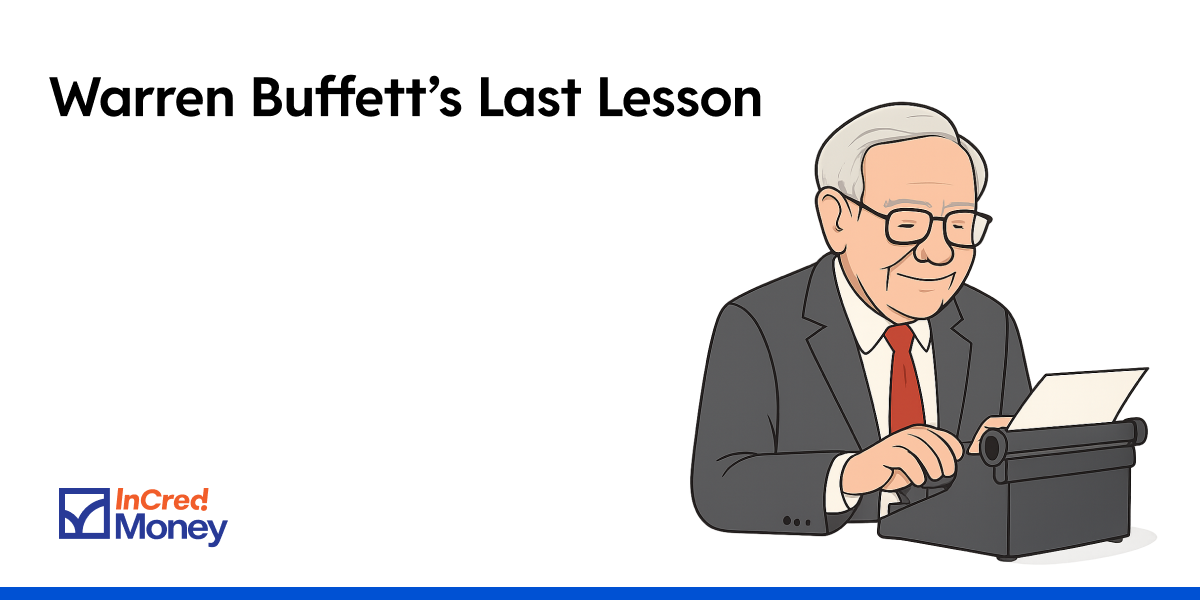There are moments in life when an entire era feels like it quietly turns a page. Reading Warren Buffett’s final shareholder letter was one such moment for me. It wasn’t just a farewell note from the world’s most admired investor — it felt like a gentle, generous summing-up of a life lived with clarity, discipline, and deep humanity.
In many ways, the letter is also a tribute he pays to the people who shaped him: his childhood influences, his family and friends, Charlie Munger, and the countless colleagues and shareholders who helped build Berkshire.
I’ve tried to capture a few thoughts here, but honestly, you should read the letter in full. It’s one of the most heartfelt pieces you’ll ever read.
Since 1965, Buffett has been writing what is famously known as ‘Warren Buffett’s letters to shareholders’, and influencing few deceptively simple principles into us. To name a few:
- The importance of staying within your circle of competence.
- The obsession with understanding the underlying business, not just the stock price.
- The discipline of avoiding leverage you don’t need.
- The insistence on aligning with good people, because bad partners can ruin even a good business.
- And above all, the belief that reputation is a moat built slowly but destroyed instantly.
Buffett’s final letter carries these familiar threads, but it also carries something rarer: the vulnerability of a 95-year-old man reflecting on luck, mortality, envy, and the responsibilities we owe to others.
One of the most important lessons he leaves us with is the danger of envy, especially in leadership. Buffett writes candidly about how compensation disclosures, intended for transparency, instead fueled CEO envy and unnecessary pay ratcheting.
Envy, in general, doesn’t do anyone a lot of good. It’s so easy to get caught up in what everyone else is doing: a competitor’s valuation, another startup’s big funding round, or those trading P&Ls people love sharing.
But let’s be honest: we only see the wins, not the losses, behind the scenes. After a while, you realise the only game worth playing is your own.
Another thread in the letter speaks to something many leaders postpone for too long: planning for what happens after we are gone.
Buffett lays out, very plainly, why Greg Abel will take over Berkshire as the CEO and how Buffett’s wealth will eventually flow into his children’s foundations. What was also refreshing was how openly he endorsed his successors and explained why they are the right choice.
What moved me was not the scale of the giving but the humility: a recognition that luck played an oversized role in his life and that wealth carries an obligation to be returned to society.
Succession planning is indeed very important, especially when I think about some of the succession struggles in Indian businesses: the Ratan Tata and Cyrus Mistry chapter, the public breakdown of Vijaypat and Gautam Singhania, or the recent Sona Comstar Group dispute; it becomes obvious how expensive unclear planning and the wrong transitions actually are.
Toward the end of the letter, Buffett leaves us with a simple idea: choose your heroes carefully.
Look up to the right people. Let their values shape your instincts. Like how I’ve always believed that Buffett and Charlie Munger were more than investors; they were behavioural gurus.
They shaped the investors before my time, and I have no doubt they’ll shape the ones after, teaching them how to stay calm and be long-term in a world that demands short-term theatrics. For many of us, especially those who built careers in finance, they were north stars.
But the line that stayed with me came right at the end: “You will never be perfect, but you can always be better.”
Whether in personal or professional life, that is all any of us can aspire to. At the end of the day, we don’t know everything. We will make our share of mistakes. But if we show up every day trying to be a little wiser, a little more patient, and a little more useful to those around us, perhaps we can continue the compounding of goodness they spent a lifetime demonstrating.
And maybe that, more than anything else, is Warren Buffett’s true legacy.
If you enjoyed this newsletter, feel free to share it with your friends and family.
Also, if you have any topics that you would like us to cover or any other feedback, do write to us at connect@incredmoney.com
Till the next time,
Vijay
CEO – InCred Money




